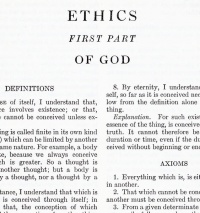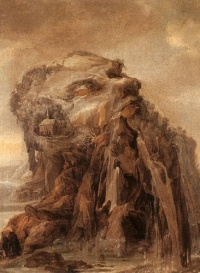17th century
From The Art and Popular Culture Encyclopedia
(Difference between revisions)
| Revision as of 08:19, 5 October 2008 Jahsonic (Talk | contribs) ← Previous diff |
Revision as of 11:09, 8 February 2009 Jahsonic (Talk | contribs) Next diff → |
||
| Line 3: | Line 3: | ||
| [[Image:Ethics by Spinoza.jpg|Spinoza's|thumb|right|200px|By virtue of his [[magnum opus]], the posthumous ''[[Ethics (book)|Ethics]]'', [[Spinoza]] is considered one of [[Western philosophy|Western philosophy's]] definitive ethicists.]] | [[Image:Ethics by Spinoza.jpg|Spinoza's|thumb|right|200px|By virtue of his [[magnum opus]], the posthumous ''[[Ethics (book)|Ethics]]'', [[Spinoza]] is considered one of [[Western philosophy|Western philosophy's]] definitive ethicists.]] | ||
| [[Image:Diagram of the human mind, from Robert Fludd (1574-1637), Utriusque cosmic maioris scilicet et minoris metaphysica.jpg|thumb|right|200px|''[[Utriusque cosmi maioris scilicet et minoris metaphysica]]'' by [[Robert Fludd]]]] | [[Image:Diagram of the human mind, from Robert Fludd (1574-1637), Utriusque cosmic maioris scilicet et minoris metaphysica.jpg|thumb|right|200px|''[[Utriusque cosmi maioris scilicet et minoris metaphysica]]'' by [[Robert Fludd]]]] | ||
| + | [[Image:Speculum Sophicum Rhodostauroticum.jpg|thumb|right|200px|Illustration to the ''[[Speculum Sophicum Rhodostauroticum]]'' ([[1618]]) by [[Teophilus Schweighardt Constantiens]]]] | ||
| {{Template}} | {{Template}} | ||
| As a means of recording the passage of [[time]], the '''17th century''' was that [[century]] which lasted from [[1601]]-[[1700]]. | As a means of recording the passage of [[time]], the '''17th century''' was that [[century]] which lasted from [[1601]]-[[1700]]. | ||
Revision as of 11:09, 8 February 2009

By virtue of his magnum opus, the posthumous Ethics, Spinoza is considered one of Western philosophy's definitive ethicists.

Illustration to the Speculum Sophicum Rhodostauroticum (1618) by Teophilus Schweighardt Constantiens
|
Related e |
|
Featured: |
As a means of recording the passage of time, the 17th century was that century which lasted from 1601-1700.
The 17th century falls into the Early Modern period of Europe and was characterized by the Baroque cultural movement and the beginning of modern science and philosophy, including the contributions of Galileo Galilei, René Descartes, Blaise Pascal, Isaac Newton; Europe was torn by warfare throughout the century, by the Thirty Years' War, the Great Turkish War and the English Civil War among others, while European colonization of the Americas began in earnest.
See also
List of years
- 1700 - 1699 - 1698 - 1697 - 1696 - 1695 - 1694 - 1693 - 1692 - 1691
- 1690 - 1689 - 1688 - 1687 - 1686 - 1685 - 1684 - 1683 - 1682 - 1681
- 1680 - 1679 - 1678 - 1677 - 1676 - 1675 - 1674 - 1673 - 1672 - 1671
- 1670 - 1669 - 1668 - 1667 - 1666 - 1665 - 1664 - 1663 - 1662 - 1661
- 1660 - 1659 - 1658 - 1657 - 1656 - 1655 - 1654 - 1653 - 1652 - 1651
- 1650 - 1649 - 1648 - 1647 - 1646 - 1645 - 1644 - 1643 - 1642 - 1641
- 1640 - 1639 - 1638 - 1637 - 1636 - 1635 - 1634 - 1633 - 1632 - 1631
- 1630 - 1629 - 1628 - 1627 - 1626 - 1625 - 1624 - 1623 - 1622 - 1621
- 1620 - 1619 - 1618 - 1617 - 1616 - 1615 - 1614 - 1613 - 1612 - 1611
- 1610 - 1609 - 1608 - 1607 - 1606 - 1605 - 1604 - 1603 - 1602 - 1601
Unless indicated otherwise, the text in this article is either based on Wikipedia article "17th century" or another language Wikipedia page thereof used under the terms of the GNU Free Documentation License; or on research by Jahsonic and friends. See Art and Popular Culture's copyright notice.


,_Utriusque_cosmic_maioris_scilicet_et_minoris_metaphysica.jpg)

